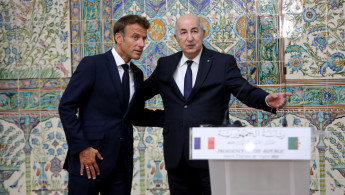Algeria denounces France's support for 'Morocco sovereignty' over disputed Western Sahara
Algeria has slammed France's backing of Morocco's autonomy plan and sovereignty over the disputed Western Sahara, a surprising shift from Paris' usual hands-off approach in the North African neighbours' four-decades disagreement on the disputed territory.
On Thursday, 25 July, Algeria expressed "great regret and strong denunciation" over the French government's decision to recognise an autonomy plan of the Western Sahara region "within Moroccan sovereignty."
"Algeria was informed of the decision by France in recent days" declared the Algerian Foreign Ministry in a press release, adding that Algeria would hold the French government fully responsible for any consequences resulting from this decision.
So far, the French Ministry of Foreign Affairs has declined to comment on Algiers’ statement or confirm the news.
Rabat has also remained silent, but the Moroccan press is already celebrating "the new position". "France supports the Moroccan sovereignty over the Sahara, Algeria fumes," headlined the news website Hespress, close to Rabat.
For over four decades, the Western Sahara issue has been a major source of tension between Rabat and Algiers. Morocco considers its sovereignty over Western Sahara a non-negotiable national cause, while Algeria supports the pro-independence Polisario Front, which also claims sovereignty over the territory.
The UN does not recognise the sovereignty claims of either Morocco or the Polisario Front.
Algiers halted diplomatic ties with Rabat in 2021 following the US recognition of Morocco's sovereignty over Western Sahara in exchange for Rabat's normalisation with Israel.
As France attempts to mend ties with its former colonies, French President Emmanuel Macron has avoided taking a firm stance on Western Sahara – an issue the North African arch-enemies don't take lightly.
Since appointing Gabriel Attal as Prime Minister in January, French diplomacy has leaned more towards Rabat. This followed a diplomatic crisis with Morocco from 2021 to 2023, involving a spying scandal, and visa restrictions, fuelled by Paris' ambiguous stance on the disputed territory.
During his visit to Rabat in February, French Foreign Minister Stéphane Séjourné expressed his government's willingness to "accompany Morocco in its development" of the territory.
Since 2007, France has supported the autonomy plan for Western Sahara proposed by Rabat, but without explicitly recognising the "Moroccan sovereignty" of the territory, in line with UN resolutions that advocate for the region's self-determination.
However, a shift in French policy may be forthcoming, as Paris has already started sponsoring several projects with Rabat in the phosphate-rich region.
This potential policy change comes as Attal's government approaches its end. President Macron has stated he will not appoint a new prime minister until after the Paris Olympic Games.
The New Popular Front (NFP), a broad left-wing alliance, won the early legislative elections and is set to lead the new government. Most of its leaders, except for Tangier-born Jean Luc Mélenchon, oppose a pro-Morocco stance on the territory.
Morocco took control of most of Western Sahara in 1975 after an agreement with Spain and Mauritania, which also claimed the territory at the time. This led to a guerrilla war with the Polisario Front, which asserts that the desert region in northwest Africa belongs to it.
The United Nations brokered a ceasefire in 1991 and established a mission to organise a referendum on the territory's future, but negotiations have been deadlocked ever since.




 Follow the Middle East's top stories in English at The New Arab on Google News
Follow the Middle East's top stories in English at The New Arab on Google News


![A group of Palestinians, foreign and Israeli activists gather to participated in an olive picking event on the land in the town of Battir, which is under threat of confiscation by Israel in Bethlehem, occupied West Bank on 8 November 2024. [Getty]](/sites/default/files/styles/image_330x185/public/2182930803.jpeg?h=199d8c1f&itok=__0LgGsa)